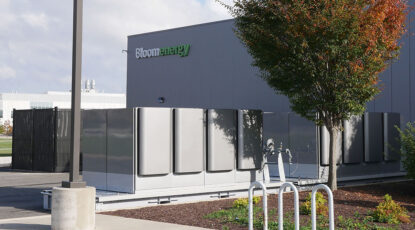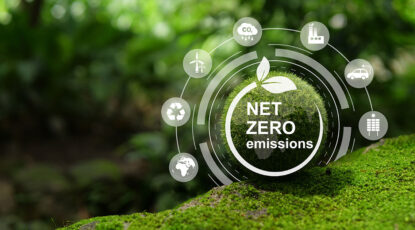We started the ASPIRE Forum as a two-day annual event in 2015 to bring together diverse voices to explore the global energy landscape in today’s fast growing digital economy and to shed light on how organizations are leading efforts to address the social and environmental challenges the world faces today.
This year we are hosting a series of mini virtual meetings. Earlier this month we convened business and civic leaders for another installment in our Bloom Energy ASPIRE Series. This conversation focused on finding workable solutions to what I see as the biggest challenges facing our planet. We need to collaboratively develop local and global action plans with a sense of urgency to both adapt to and solve the climate crisis.
My biggest takeaway from these conversations is this: there are many areas where there is political and public consensus on actions we can take today — we must develop, advance and implement policy in these areas to start with. We can then build on that momentum and earned mutual trust to keep advancing our goal to decarbonize the atmosphere.
In the past decade, our planet has experienced record heat. It has witnessed a dramatic increase in scale, severity and frequency of extreme weather. Communities around the globe have suffered through devastating hurricanes, heat waves, tornadoes, and wildfires of terrifying intensity that left millions without essential necessities like power and clean water. The climate is changing and its impact on our way of life is one of the most complex and important issues of our time.
How do we design and support an energy infrastructure that makes our communities safe, more resilient, and sustainable for future generations? And, can we accomplish this while expanding economic opportunity and a higher quality of life?
It was an honor for Bloom Energy to host a diverse group of distinguished invited speakers with CNN’s Fareed Zakaria as moderator to discuss these topics. The speakers were:
- Jennifer Granholm, U.S. Secretary of Energy
- Chris Coons (D-DE), U.S. Senate
- Jimmy Panetta (D-CA 20th), U.S. House of Representatives
- Lynn Good, Chair, President and CEO, Duke Energy
- Luke Bronin, Mayor, Hartford, Connecticut
- Cindy Chavez, Supervisor, Santa Clara County, California
- Adrian Garcia, Commissioner, Harris County (Houston), Texas
This year, the conversations centered on how, in a digitally transformed world, electricity and energy are basic human needs that are necessary without disruption. We focused our discussion on the need to adapt to climate related events, the increasing need for energy resilience, and the need to protect our energy infrastructure from cyberattacks.
In a digitized world, where the demand of reliable power increases daily, we must ensure that there is a sufficient supply that is clean, resilient, and affordable for everyone no matter the location. Bloom Energy was founded in 2001 with the mission to deliver just that. Our team is diligently at work creating the blueprint and establishing the foundation for this ambitious goal.
“Because extraordinary times call for extraordinary leaders.”
KR SridharFounder, Chairman, and CEO, Bloom Energy
The Global Demand for Clean Technology: A 23 Trillion Dollar Market
Secretary Granholm spoke passionately about the Department of Energy’s support and execution of the Administration’s Climate Action Plan. Their $1.5 billion research and development plan, coupled with the American Jobs Plan, is the first step to creating a significant number of new jobs in the energy sector. They are also rolling out their Energy Earthshots initiative with the goal of lowering costs, raising performance and clearing the way to their clean energy goals. We’re excited that their first such Energy Earthshot is focused on lowering the cost of clean hydrogen over the next 10 years.
We, along with Secretary Granholm, are enthusiastic about the possibility of bipartisanship in Congress because of the shared goal of so many, including investment in broadband, roads and streets, and energy, as well as the creation of a significant number of new jobs.
“We need to add capacity. We need to add resiliency. And we need to make sure the grid is secure…”
Jennifer GranholmU.S. Secretary of Energy
These policy initiatives will also move the world closer to achieving extraordinary climate goals, including lowering emissions, investing in new technology, and maximizing the resilience of land and water resources. The Secretary stressed the importance of exercising the muscles of solar and wind, installing clean technologies that will reduce carbon emissions, and addressing the need to clean up natural gas production in the United States. She also spoke about the need for grid resilience to prevent future blackouts on the scale of the Texas crisis and to secure the grid against cyberattacks.
As CEO of Duke Energy, Lynn Good is a model leader in the clean energy transition. Duke Energy’s carbon emissions goals are bold – they have already reduced emissions by 40 percent and aim to be net zero by 2050. This comes as they invest $60 billion over the next five years to double renewable energy and oversee the largest retirement of coal in the industry. None of this progress happens without innovation, research, and development. Lynn shared that as they approach 70-80 percent carbon reduction, they will look to new technologies like hydrogen, carbon capture, advanced nuclear, long-duration storage, and geothermal.
“…frankly, we don’t see a way right now to get to net zero without that innovation. I believe as a country we’re capable. With the investment in R&D, the work of the national labs, we can get there. But we’ll be looking for those technologies in the 2030s and are real advocates for spending in the ’20s so that we have the technologies available to invest in to take to commercial scale.”
Lynn GoodChair, President and CEO, Duke Energy
She also highlighted the practical importance of reliable energy sources – hospitals that need uninterrupted power, elder care facilities with at-risk populations, and customers at home who rely on oxygen. This requires both resilient grids and backup power supplies to maintain a consistent power source.
Bipartisan Cooperation: Policy Priorities
We only accomplish our long-term goals as a nation with true bipartisan cooperation. Senator Chris Coons of Delaware and Representative Jimmy Panetta of California’s 20th district both have a vested interest in protecting the grid and providing the necessary resources for their constituents through bipartisan federal policy.
Senator Coons is confident in President Biden’s expectation of bipartisanship because it is more likely to hold enduring support from the place where it matters most – communities and the constituents who depend on reliable and clean energy. Senator Coons is currently working on the SCALE Act, alongside Republican colleagues, which looks specifically at the incentives required to build out the pipelines that would be needed for industrial-scale carbon capture.
“As we make a transition to a zero-carbon economy, we’ve got to build the hard infrastructure that would transport carbon dioxide from where it’s generated and captured and compressed to where it would be injected, whether offshore or onshore.”
Chris Coons (DE)U.S. Senate
I firmly agree that finding ways to reduce carbon emissions is critically important. The pathways to zero carbon base-load electricity include commercially viable carbon capture utilization and storage.
Representative Panetta has interests in making sure the policy he supports is locally focused. In California, residents have seen the direct effects of climate change through disastrous wildfires this past decade.
“We’re at an inflection point right now- we need the proper investment to affect the lives in our community” and in that light, “We cannot spare any expense- we are fighting for the middle class- as leader of the free world.”
Jimmy Panetta (CA-20)U.S. House of Representatives
Representative Panetta is an advocate for introducing microgrids as a solution. He stated that we must ensure “that we have microgrids, not just for towns, for communities, but for hospitals, but for individuals and, individual homes as well.” Whether human or weather-caused, we have to make sure our communities can withstand any emergency situation and are adequately prepared.
What We Are Doing at Bloom Energy Now
These conversations are immensely important. It educates us and inspires us to stay focused on our mission. It sets up meaningful and thought provoking dialogue that lead to majority consensus and a path forward.
If you were unable to attend the event, you can watch the replay here.




